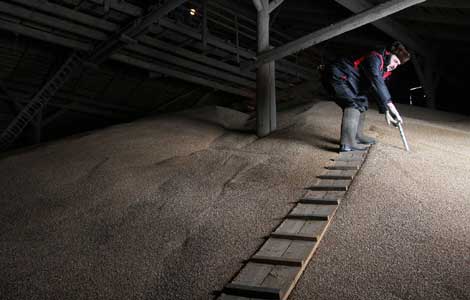Economy
Russia set to boost global grain supply
Updated: 2011-05-31 07:37
By Maria Kolesnikova and Marina Sysoyeva (China Daily)
 An employee takes samples of Russian wheat from a grain store in Serebryanye Prudy, Russia. The country, which was once the second-biggest wheat exporter, will allow a ban on grain exports to expire on July 1, the Russian government said. Andrey Rudakov / Bloomberg |
The country allows more of the crop to enter the market as futures soar
LONDON / MOSCOW - Russia, once the world's second-biggest wheat exporter, will allow a ban on grain exports to expire on July 1, increasing supply as drought and flooding threaten crops from Europe to the United States.
Farmers planted 10 percent more, and stockpiles exceed 6 million tons, said First Deputy Prime Minister Viktor Zubkov, according to a government statement. Russian grain traders have accelerated purchases in the past several weeks, moving supply to silos near ports in anticipation of the end of the ban that began in August, according to the agricultural researcher SovEcon on May 20.
Wheat futures have jumped 79 percent in the past year in Chicago, the global benchmark, as drought and flooding from Canada to Russia and Europe destroyed crops. Russia's export ban, combined with quotas on shipments imposed by Ukraine, reduced supply and contributed to global food prices, as tracked by the United Nations, surging to a record in February.
"Whether they actually have major exports from that time or not remains to be seen," said Michael Pitts, commodity sales director at National Australia Bank in Sydney. "There's a lot of uncertainty regardless of the announcement" on May 28, he said. The ban's removal doesn't necessarily mean there will be enough supply to make up for potential losses in Europe and the US, he said.
Exports from Russia are unlikely to be a record and it may take time for shipments to resume, said Dmitry Rylko, general director of the Institute for Agricultural Market Studies in Moscow. Concerns about the weather and crops around the world mean "we shouldn't expect a significant price drop", he said.
Prices increase
About 45 percent of the US winter wheat crop was in very poor or poor condition, the US Department of Agriculture (USDA) said on May 23. France's soft-wheat crop, the European Union's largest, will decline 12 percent, and German output will slide 7.2 percent, local forecasters said on May 18.
By contrast, Russia's Agriculture Ministry estimates the total grain harvest may be 85 million to 90 million tons, up from 60.9 million tons last year.
Russia will export 10 million tons of wheat in the 12 months ending in June next year, up from 4 million tons in the current year, according to the USDA. That's less than the 18.6 million tons sold a year earlier. Corn shipments will increase to 1 million tons from 25,000 tons and barley cargoes to 800,000 tons from 300,000 tons, the USDA estimates.
Quality issue
While the country has about 4 million tons of wheat available for export in its southern regions, as much as half of it may not be of sufficient quality to ship, said Alexander Korbut, vice-president of Russia's Grain Union, the largest lobby group for cereal exporters. Russian ports can handle as much as 3.5 million tons a month, he said.
The resumption of shipments may drive international wheat costs down by between 5 and 7 percent, while boosting domestic prices by 15 to 20 percent, Korbut said.
On May 24, Ukraine's President Viktor Yanukovych said in an interview that he would lift export quotas because of forecasts for a 15 percent increase in the harvest. Ukraine, once the world's biggest exporter of barley, set export quotas on corn, wheat and barley in October after drought ruined crops.
Increasing Russian and Ukrainian supplies will help offset anticipated declines elsewhere.
The US, the biggest wheat exporter, will ship 29 million tons in the next marketing year, down from 35.5 million tons this year, according to the USDA.
'Weather risks'
"The weather risks that are developing in other producing regions will be more than enough to offset any type of exports coming out of Russia," said Erin FitzPatrick, an analyst at Rabobank International in London, before the Russian announcement.
"Wheat prices will stay at elevated levels." The jump in world food prices has contributed to inflation accelerating around the world, spurring at least two dozen central banks and the European Central Bank to raise interest rates this year, according to Bloomberg data.
Bloomberg News
E-paper

Tapping into the future
Foreign companies are investing in China's water industry as many predict a growing profit margin.
Preview of the coming issue
Headhunters ride on growth
Commercial property rides wave
Specials

China Daily marks 30th birthday
China's national English language newspaper aims for a top-notch international all-media group.

Cuisine central
London's Chinatown is helping diners appreciate full palate of Chinese food

Tying the knot
Danish couple's high-end macrame export business takes off in the mountains of Yunnan.
